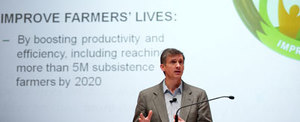Monsanto exec says food production will have to double in the next 40 years
Published: March 4, 2011 / Author: Ed Cohen

With the world’s population expected to increase by a third over the next 40 years, to 9.2 billion people, food production needs to double.
The only way to do that is if agriculture can become more efficient, an executive with the global agribusiness company Monsanto said today at Notre Dame.
Jerry Steiner, executive vice president, sustainability and corporate affairs for The Monsanto Company, said the planet will have to produce as much food from 2000-2050 as it did in the previous 10,000 years (an estimate from participants in a U.N.-backed forum on sustainability). That won’t be easy because agriculture already uses 66 percent of the world’s fresh water and 55 percent of farmable land.
“[T]here aren’t that many (more) acres that we can farm,” Steiner said.
It’s not just the raw numbers of population increase and because people living longer. Steiner said changes in diet are adding to pressure on the world’s food-production system.
According to statistics he shared, in 1980 the average Chinese citizen consumed 32 pounds of meat per year.
In 1995 it was 86 pounds.
In 2007 it was 117 pounds. And that’s still only half of what Americans eat.
Steiner said an increased appetite for meat typically follows improved economic conditions. As incomes rise from $2 a day to $10, people tend to replace the carbohydrates in their diet, like rice, with proteins like meat, he said, citing research by an economist formerly with the World Bank.
Steiner said that when he started working for Monsanto in the early 1990s, China imported no soybeans, an economical source of protein for animal feed.
Today the world’s most populous nation imports 55 million metric tons of soybeans a year, equal to the entire U.S. crop. The imports come primarily from the United States, Brazil and Argentina, he said.
There are other sustainability issues facing agriculture, he said.
Rural areas are often home to a country’s poorest citizens. Steiner, who grew up on a family dairy in New Holstein, Wis., said 1 in 6 people in the world go hungry today. Half of them are farmers; they can’t make enough money to feed themselves.
There are also environmental challenges.
Agriculture emits about the same amount of greenhouse gasses as the transportation industry, he said. Most of that comes from rice production – which, as a flooded crop, vents nitrous oxide – and cattle, which emit methane along with manure.
Monsanto, one of the world’s largest seed producers, is constantly developing new hybrids to boost crop yields, he said. The company also conducts research in biotechnology, genetically modifying plants to make them, for example, more resistant to insects.
Steiner said farmers in India using the company’s insect-resistant varieties of cotton are seeing 30 to 60 percent higher yields, and the combination of higher yields and having to use less pesticide has doubled their incomes.
His talk was part of the Ten Years Hence speaker series of the Mendoza College of Business, which explores issues, ideas and trends likely to affect business and society over the next decade. Audiences at the lectures are typically made up of students, but this lecture also drew a few dozen attendees from the local community.
During the question-and-answer session after his talk, Steiner fielded questions for more than 20 minutes. All but one came from community members, and all of the questioners expressed skepticism about Monsanto’s business practices and motives.
Several people asked about the potential health and environmental effects of genetically modified crops. One undergraduate accounting student asked why Monsanto has opposed mandatory labeling of genetically modified foods.
Steiner said the U.S. Food and Drug Administration determined that conventional and genetically modified crops are substantially the same, so no labeling is required. He said many producers have elected to label their products as non-genetically modified, and these products can easily be found in grocery stores.
The Ten Years Hence speaker series is sponsored by the O’Brien-Smith Leadership Program, made possible by a generous endowment from William H. O’Brien (ND ’40) and his wife, Dee. The O’Brien-Smith Program endowment provides an opportunity for students and faculty to interact with distinguished leaders from business, government and nonprofit sectors.
/news_and_events/news_articles/article/8595/monsanto-exec-says-food-production-will-have-to-double-in-the-next-40-years




